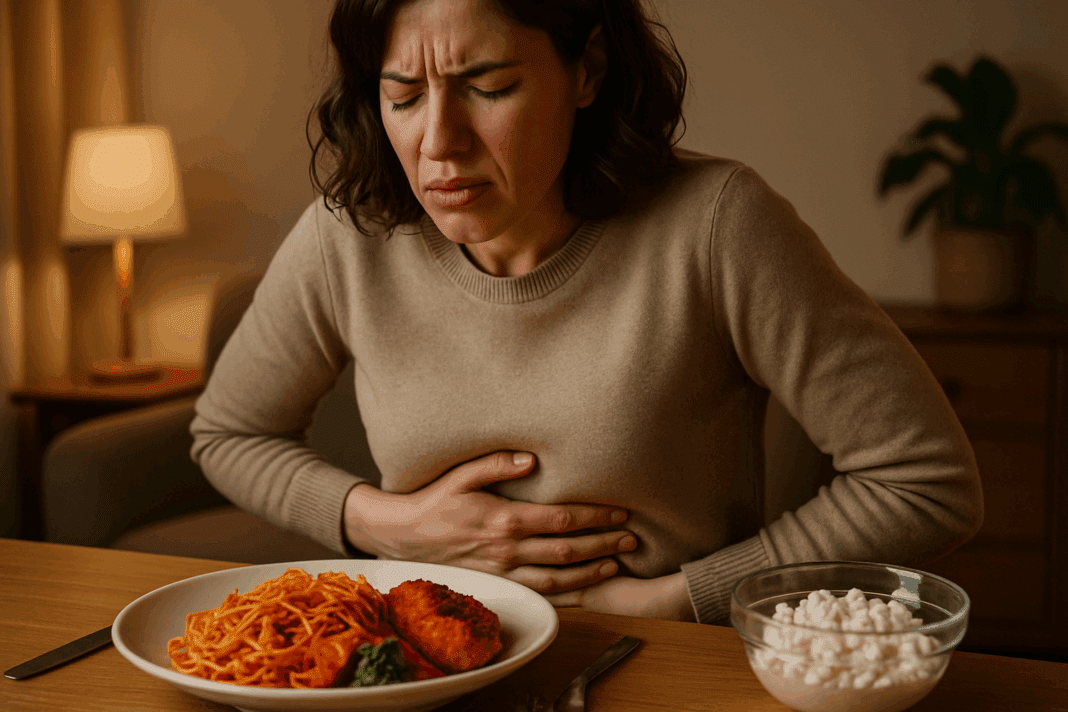Feeling stomach pain after eating is an experience that many people face yet few understand fully. For some, it may be an occasional nuisance, but for others, it can become a chronic and distressing pattern. From a mild sensation of stomach discomfort after eating to a terrible stomach ache after eating every meal, the causes can range from benign digestive quirks to more serious underlying conditions. Understanding why your belly hurts every time you eat is not just about avoiding discomfort—it’s about protecting your overall health. This article will explore the many reasons behind abdominal pain after eating and offer natural strategies for lasting relief.
You may also like: How to Stop Emotional Eating and Regain Control: Mindful Nutrition Strategies That Support a Healthier Lifestyle
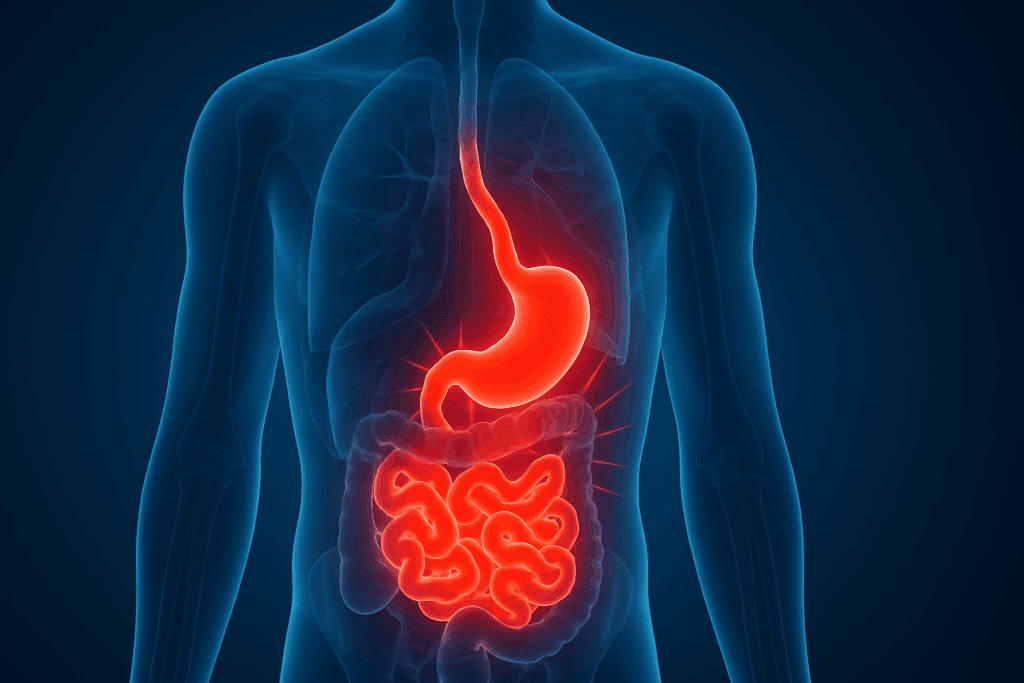
What Does Stomach Pain After Eating Really Mean?
Stomach pain after eating is a broad term that covers various types of gastrointestinal distress, including bloating, cramping, burning, or sharp pain. It can arise in the upper, middle, or lower abdomen and may last minutes or persist for hours. For some individuals, the experience is described as a dull ache, while others report intense, cramping sensations. Stomach cramps after eating may come on suddenly or build gradually depending on the underlying cause. It’s important to distinguish whether the pain is fleeting or recurring, as this can guide both diagnosis and treatment.
This type of pain often signals that something about the digestive process isn’t working smoothly. Gastric discomfort after eating could be caused by the food itself, the way it’s eaten, or by how the digestive organs are functioning. In many cases, the simple act of eating triggers pain due to existing inflammation, food intolerances, or structural problems within the digestive tract. If you frequently find yourself thinking, “Every time I eat, my tummy hurts,” or “Why does my stomach always hurt after I eat?” you are not alone—and you deserve answers.
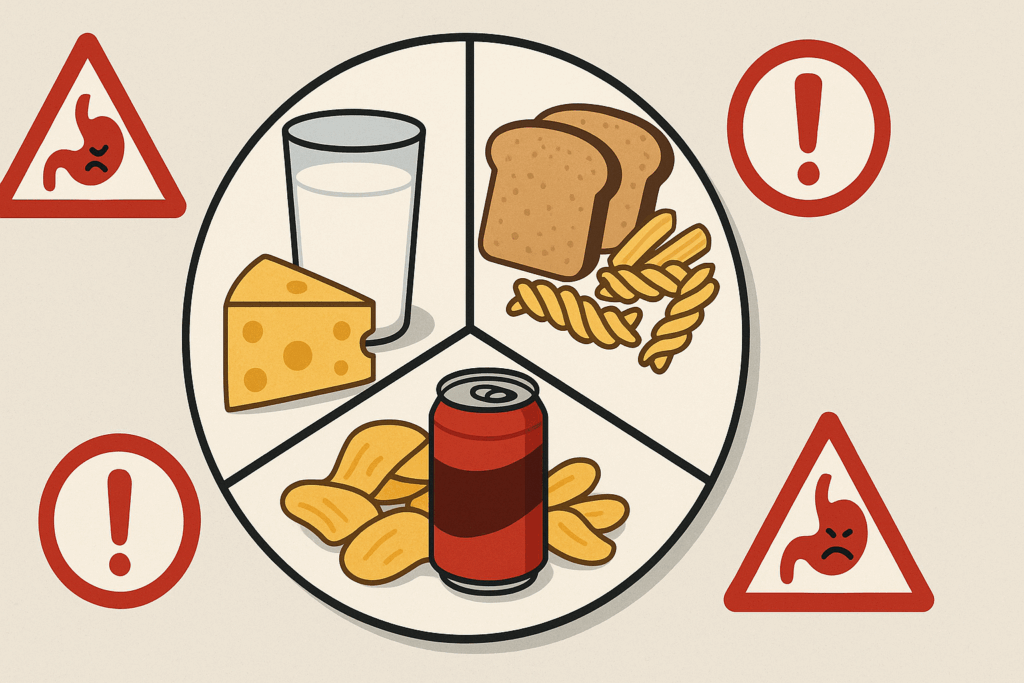
Common Digestive Causes of Abdominal Pain After Eating
Several digestive conditions can lead to abdominal pain after eating. One of the most common culprits is functional dyspepsia, often referred to as indigestion. This condition is characterized by a feeling of fullness, bloating, or burning in the upper abdomen after meals. In many cases, the stomach pain after every meal doesn’t correlate with how much food is consumed, which can be especially confusing for sufferers.
Another frequent cause is gastritis, or inflammation of the stomach lining. Gastritis can produce burning pain in the upper abdomen, often triggered or worsened by meals. This condition may stem from infections like H. pylori, regular use of NSAIDs, or excessive alcohol intake. Gastric discomfort after eating is often pronounced in those with gastritis, especially when the meal contains spicy or acidic components.
Irritable bowel syndrome (IBS) is another major factor behind post-meal abdominal pain. IBS-related cramps after eating are often linked to bowel movement irregularities and can occur alongside bloating, diarrhea, or constipation. For individuals with IBS, even a small amount of food can provoke an outsized response in the digestive tract. If you often think, “Whenever I eat, my stomach hurts,” IBS could be worth exploring with a healthcare provider.
Food Intolerances and Sensitivities: Hidden Triggers of Pain
Food intolerances are often overlooked when evaluating causes of stomach pain. Lactose intolerance, for example, affects individuals who lack the enzyme needed to digest lactose, the sugar found in milk. When lactose isn’t broken down properly, it ferments in the gut, causing gas, bloating, and stomach cramps after eating dairy products. Similarly, those with gluten sensitivity or celiac disease experience abdominal pain after eating foods containing wheat, rye, or barley.
Even without a formal allergy or intolerance, some people experience gastric discomfort after eating due to highly processed foods, artificial sweeteners, or high-fat meals. These foods can slow down digestion, increase gas production, or irritate the intestinal lining. Individuals who say “everything I eat makes my stomach hurt” may be dealing with broad-spectrum sensitivities that require dietary adjustments and professional guidance.
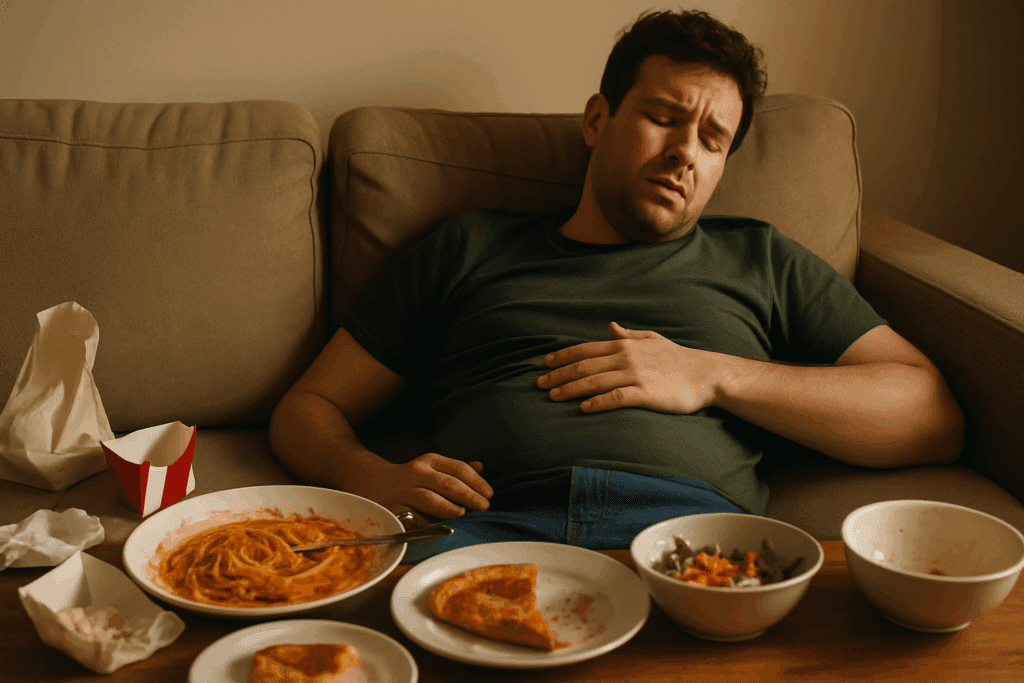
What Happens If You Eat Too Much? Understanding the Impact of Overeating
One of the simplest explanations for post-meal stomach discomfort is overeating. Eating more food than your stomach can comfortably handle stretches the stomach lining and triggers pressure-related pain. When people ask, “What happens when you overeat?” the answer lies in both mechanical and hormonal responses. The stomach produces more acid to break down the food, which can lead to reflux, while distention activates stretch receptors that signal discomfort.
This sensation of fullness may lead to a lower stomach ache after eating or an overall sense of sluggishness and malaise. If you find yourself frequently saying, “My tummy hurts after I eat,” particularly after large meals, your body may be signaling that it’s time to scale back portion sizes. Learning how to ease your stomach after eating too much can involve strategies like walking after meals, staying upright, or sipping herbal teas to aid digestion.
Serious Conditions That May Cause Stomach Pain After Eating
While many cases of abdominal pain after eating are benign or functional, some can signal more serious conditions that require medical evaluation. Gallstones, for instance, often trigger a terrible stomach ache after eating fatty foods. Pain from gallstones typically originates in the upper right abdomen and may radiate to the back or shoulder. The discomfort may appear suddenly and mimic a heart attack in its intensity.
Pancreatitis is another condition that can provoke significant pain after meals. The pancreas plays a vital role in digestion by releasing enzymes, and when it becomes inflamed, the resulting pain can be severe. People with pancreatitis may experience worsening pain after eating, especially high-fat foods. If you’re wondering, “Why does my stomach hurt so bad after I eat?” and the pain is severe and persistent, it’s important to seek medical attention promptly.
Peptic ulcers, which are sores that develop in the stomach lining or the upper part of the small intestine, are also notable causes. These ulcers can cause burning or gnawing pain that may worsen with or shortly after eating. If you’re experiencing stomach pain after every meal, particularly one that feels sharp or acidic, ulcers should be considered as a possible cause.
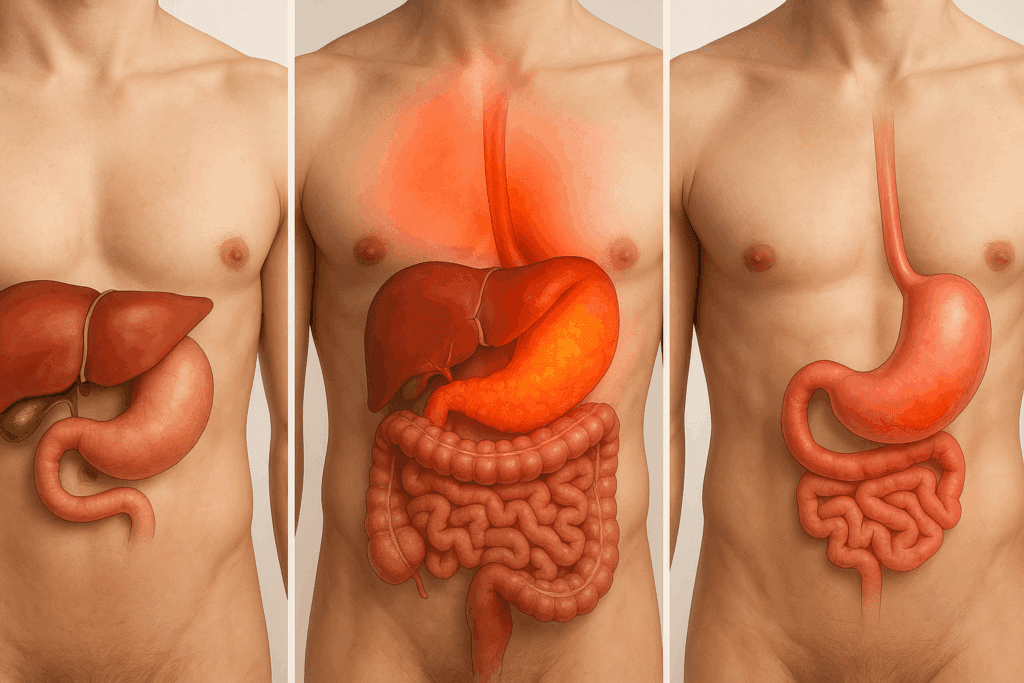
Why Does It Hurt When I Eat? Behavioral and Emotional Influences
Beyond physical conditions, behavioral and psychological factors can significantly influence digestive comfort. Stress and anxiety are closely linked to gut function through the brain-gut axis. When under emotional distress, the body diverts energy away from digestion, which can lead to symptoms like cramps after eating, bloating, or nausea. If you notice that your symptoms worsen during times of stress, this could be a sign of psychogenic abdominal pain.
Eating too quickly or without mindfulness can also exacerbate discomfort. Rapid eating often leads to swallowing air, which contributes to gas and bloating. Moreover, failing to chew thoroughly puts extra pressure on the stomach to break down food, delaying digestion. People who say “why does my stomach cramp after I eat?” may benefit from slowing down their meals and practicing mindful eating habits to reduce these functional issues.
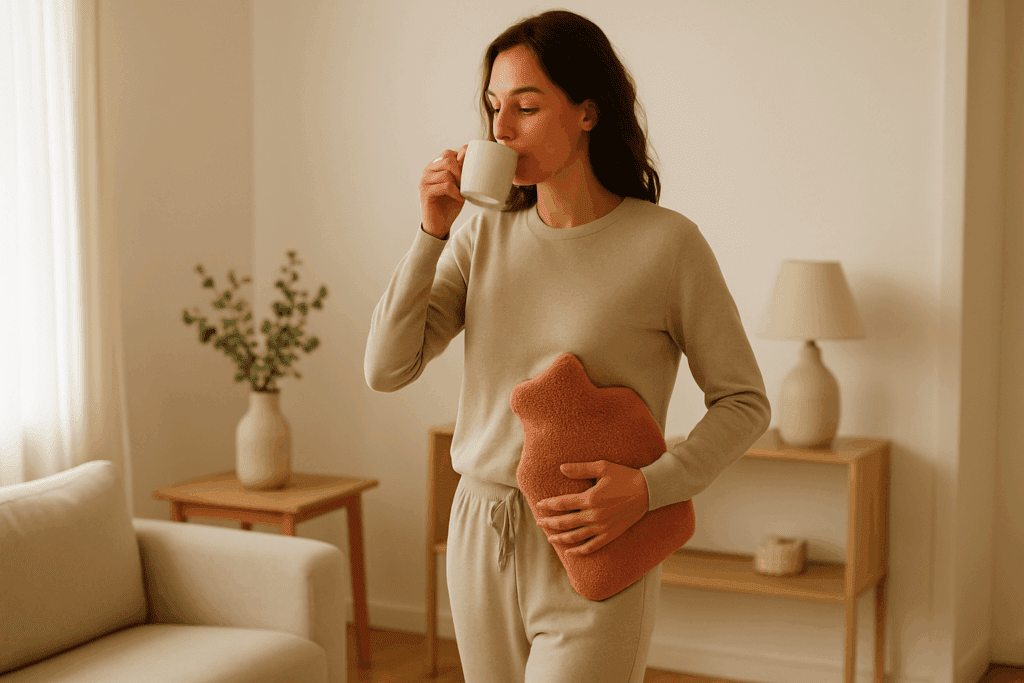
How to Relieve Stomach Pain From Overeating: Natural and Practical Approaches
Relieving stomach pain after overeating doesn’t always require medications. Several natural methods can help soothe the digestive system and alleviate symptoms. One effective strategy is gentle movement—taking a short walk after a meal can promote peristalsis and help move food through the digestive tract more efficiently. This can be especially helpful if you ate too much and feel heavy or bloated.
Hydration is another key element. Drinking water before or after meals—not during—can aid digestion without diluting stomach acids. Warm beverages like ginger tea or peppermint tea are known to have carminative properties that relax the digestive tract, reducing cramps and gastric discomfort after eating. Applying a warm compress to the abdomen may also relieve muscle tension and promote blood flow to the area, easing pain.
Mindfulness around meal size and timing plays a preventative role. Eating smaller, more frequent meals and avoiding late-night snacking can reduce the likelihood of experiencing lower stomach ache after eating. Keeping a food journal to identify and eliminate personal triggers can also be highly effective for those who feel, “Whenever I eat, my stomach hurts.”
When to Seek Medical Advice for Persistent Symptoms
Although many cases of post-meal stomach pain are mild and manageable at home, certain signs indicate the need for professional evaluation. If you experience stomach pain after eating that is severe, recurring, or accompanied by symptoms like weight loss, vomiting, or changes in bowel habits, it is important to consult a healthcare provider. These may be signs of a more serious condition like an ulcer, gallbladder disease, or even gastrointestinal cancer.
Furthermore, if the pain disrupts your ability to enjoy meals or impacts your quality of life, don’t ignore it. Statements like “Why does my tummy hurt after I eat?” or “Why does my stomach hurt after I ate?” should not become daily reflections. Getting a clear diagnosis allows for targeted treatment and avoids the cycle of guesswork and unnecessary suffering.
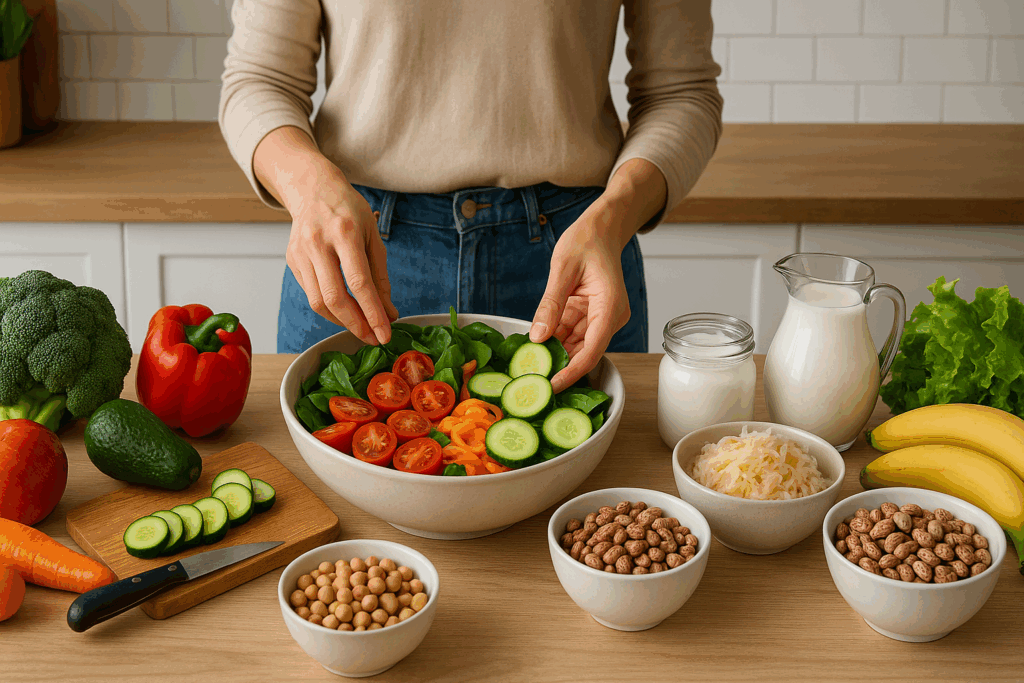
Building a Gut-Healthy Lifestyle for Long-Term Relief
Creating a lifestyle that supports digestive health can go a long way in preventing abdominal pain after eating. A diet rich in fiber from fruits, vegetables, whole grains, and legumes promotes regular bowel movements and reduces bloating. Probiotic-rich foods like yogurt, kefir, sauerkraut, and kimchi help maintain a healthy gut microbiome, which is essential for optimal digestion.
Equally important is managing stress through mindfulness techniques such as meditation, yoga, or deep-breathing exercises. These practices help regulate the nervous system and can reduce the likelihood of experiencing cramps after eating due to emotional distress. Physical activity also plays a role in stimulating digestion and reducing the risk of constipation, a common contributor to post-meal discomfort.
Avoiding common triggers such as carbonated beverages, highly processed snacks, and artificial sweeteners may also be helpful. For those who feel that “everything I eat makes my stomach hurt,” working with a registered dietitian or gastroenterologist to tailor a low-FODMAP or elimination diet may reveal hidden sensitivities that can be managed effectively with the right plan.
Frequently Asked Questions: Understanding and Managing Stomach Pain After Eating
Why does my stomach hurt more after healthy meals than junk food?
It might seem counterintuitive, but some people experience more stomach pain after eating nutrient-dense meals than processed ones. This can occur when switching too quickly to high-fiber foods, like legumes or cruciferous vegetables, which may cause gas and bloating in sensitive individuals. While these foods are beneficial for long-term digestive health, the transition period may cause temporary gastric discomfort after eating due to fermentation of undigested fibers in the gut. Junk foods, being lower in fiber and often high in fat, may digest differently and trigger fewer immediate symptoms—though they contribute to inflammation over time. If every time you eat your stomach hurts, even with healthy meals, try introducing new foods slowly and chew thoroughly to ease the process.
Can posture affect stomach pain after eating?
Yes, posture can play a significant role in digestion and comfort after meals. Sitting or slouching immediately after eating can compress the abdominal cavity and slow gastric emptying, which may increase abdominal pain after eating. Those experiencing lower stomach ache after eating may benefit from sitting upright or walking lightly for 10 to 15 minutes post-meal. The position of your body affects how food travels through the digestive tract, and poor posture may worsen stomach cramps after eating by creating pressure on the intestines. Adopting better posture, especially during and after meals, can make a noticeable difference for those who say, “My tummy hurts after I eat.”
Why do I get bloated and nauseous in addition to stomach pain after every meal?
Bloating and nausea, combined with stomach pain after every meal, could signal a problem with delayed gastric emptying or gastroparesis. This condition prevents the stomach from emptying properly, causing food to remain undigested for too long, which can lead to stomach discomfort after eating and feelings of fullness even after small portions. While overeating can temporarily mimic these symptoms, persistent issues may require diagnostic evaluation. For individuals who report, “Every time I eat my tummy hurts,” and experience prolonged fullness, slow digestion or food intolerances could be contributing factors. Treatment often includes dietary adjustments, such as smaller, more frequent meals, and avoiding foods high in fat or fiber until symptoms stabilize.
What role do gut bacteria play in stomach pain after eating?
The gut microbiome—the collection of trillions of bacteria living in your digestive tract—has a profound influence on digestion and discomfort. An imbalance in gut bacteria, often called dysbiosis, can result in excess gas, bloating, and stomach cramps after eating. When certain bacterial strains are overrepresented, they may ferment carbohydrates more aggressively, leading to gastric discomfort after eating fiber-rich or sugary meals. If you feel that everything you eat makes your stomach hurt, your gut flora might be sending distress signals. Working with a practitioner to test and restore balance with probiotics and prebiotic-rich foods could help alleviate recurring symptoms.
Could emotional stress cause stomach pain even if I haven’t eaten too much?
Absolutely. Emotional stress can trigger the release of cortisol and adrenaline, which interfere with normal digestive processes. These hormones divert blood away from the gastrointestinal tract, slow peristalsis, and can lead to symptoms like stomach pain after eating, even in the absence of overeating. Stress-related cramps after eating are often described as a knot or tightness in the gut and may be accompanied by urgency to use the bathroom. For those thinking, “Why does it hurt when I eat, even if I’m calm and eat light meals?” the answer may lie in the body’s stress response. Incorporating relaxation techniques such as deep breathing or mindfulness before meals may help reduce the intensity of post-meal discomfort.
How can hormone fluctuations impact post-meal stomach pain?
Hormonal changes, particularly in women, can exacerbate gastrointestinal symptoms. Fluctuations in estrogen and progesterone can influence how food moves through the digestive tract, often slowing it down during certain phases of the menstrual cycle. This can lead to increased bloating, constipation, and lower stomach ache after eating. Hormonal shifts can also increase visceral sensitivity, making the gut more reactive to normal digestion. If you’ve noticed that your symptoms—such as “why does my belly hurt every time I eat”—are worse during specific times of the month, tracking them alongside your hormonal cycle could provide valuable insight and guide treatment.
Is it dangerous to constantly feel pain after eating, even in the absence of other symptoms?
Persistent stomach pain after eating, even without other symptoms, should not be dismissed. While it might stem from functional disorders like IBS or mild food sensitivities, it can also indicate structural or inflammatory conditions, such as ulcers or chronic gastritis. Chronic discomfort, including phrases like “why does my stomach always hurt after I eat,” suggests ongoing irritation or dysfunction that warrants medical evaluation. Over time, constant pain can interfere with appetite, nutritional intake, and quality of life. It’s important to consult with a healthcare provider if you find yourself saying, “My tummy hurts after I eat,” on a daily or weekly basis.
What should I avoid doing immediately after eating to reduce stomach cramps and pain?
Certain habits post-meal can significantly aggravate gastric discomfort after eating. Lying down immediately after a meal, drinking carbonated beverages, or engaging in strenuous exercise can all intensify symptoms of abdominal pain after eating. These behaviors may increase pressure in the abdominal cavity or slow digestion, leading to more frequent complaints like “Why does my stomach cramp after I eat?” Instead, consider gentle movement and staying upright to help your body transition smoothly into the digestive phase. Even your clothing can make a difference—tight waistbands can constrict the digestive organs and trigger a terrible stomach ache after eating.
How can mindful eating help prevent the feeling that everything I eat makes my stomach hurt?
Mindful eating encourages awareness of hunger and fullness cues, meal pacing, and food selection. Eating slowly and chewing thoroughly allows enzymes in saliva to begin the digestive process more effectively, which can reduce the risk of stomach pain after eating. Being present during meals may help individuals notice which specific foods cause discomfort and foster healthier eating behaviors that prevent overeating. For those who often say, “Whenever I eat my stomach hurts,” slowing down can significantly change the digestive experience. It also helps prevent accidental triggers—like allergens or high-fat ingredients—that might contribute to ongoing gastric distress.
What are the most effective steps to take when you’ve eaten too much and feel immediate pain?
The first step is to avoid panic and allow the body some time to adjust. Gentle movement, like a short walk, can stimulate digestion and ease pressure from a stretched stomach. Herbal teas such as chamomile or fennel may offer fast relief for stomach cramps after eating too much. Lying on your left side can also assist in gastric emptying and reduce symptoms like bloating or sharp lower stomach ache after eating. Understanding what to do if you eat too much is essential for preventing this discomfort from becoming chronic; practicing portion control and choosing lighter meals in the future can make a significant difference. If this happens often, consider how to ease your stomach after eating too much by preparing simpler meals that are easier to digest.
Conclusion: Listening to Your Gut—Why Addressing Post-Meal Stomach Pain Matters
Stomach pain after eating is more than a fleeting annoyance—it can be a critical clue that something deeper is going on with your digestive health. Whether it’s due to overeating, food intolerances, or a more serious condition, addressing the root cause of abdominal pain after eating empowers you to take control of your well-being. Ignoring symptoms like “every time I eat my stomach hurts” or “why does my stomach always hurt after I eat” can lead to long-term health complications and decreased quality of life.
Natural solutions such as mindful eating, herbal teas, portion control, and stress management offer effective ways to reduce symptoms and prevent flare-ups. For those who frequently ask, “What to do if you overeat?” or “How to relieve stomach pain from overeating?” the answer lies in building habits that support your digestive system’s natural rhythm. Ultimately, your body is constantly giving you feedback—and your stomach’s discomfort after eating is one way it asks for care, attention, and healing. By responding to these messages thoughtfully, you can restore comfort, vitality, and joy to your relationship with food.
Was this article helpful? Don’t let it stop with you. Share it right now with someone who needs to see it—whether it’s a friend, a colleague, or your whole network. And if staying ahead on this topic matters to you, subscribe to this publication for the most up-to-date information. You’ll get the latest insights delivered straight to you—no searching, no missing out.
Further Reading:
Why Does My Stomach Hurt After Eating?

